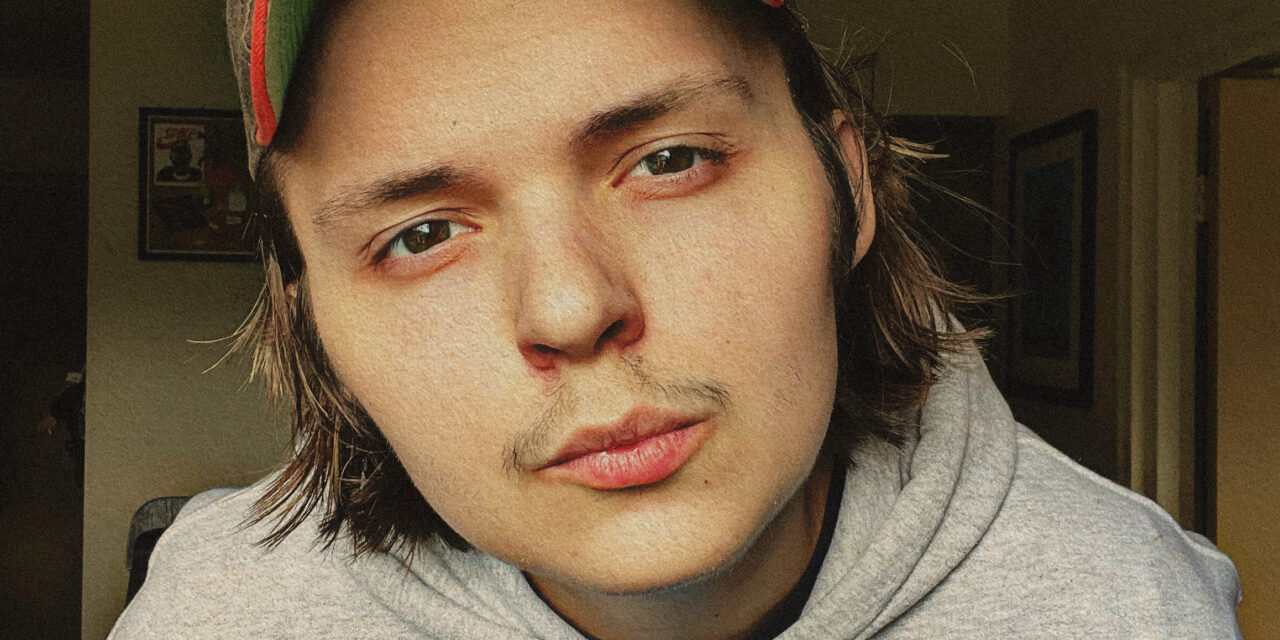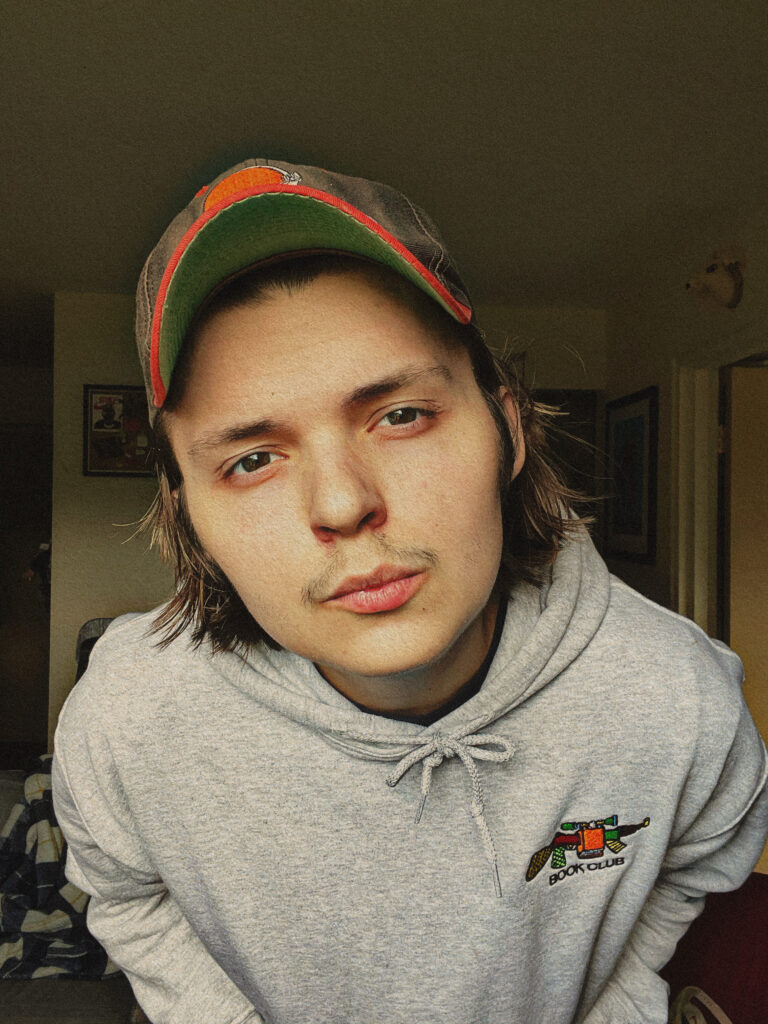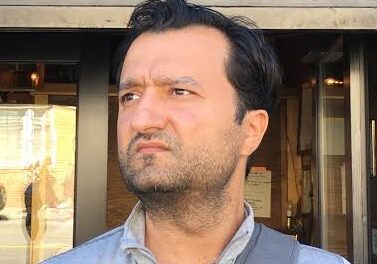Editorial Assistant Taylor Byas: In his vulnerable full-length poetry debut, The Neon Hollywood Cowboy (Big Lucks, 2021), Matt Mitchell spins us a record, songs of longing and love crooning from grainy speakers. And as I read this collection, listened to the music of each individual poem, I found myself recognizing a feeling that Mitchell threads from beginning to end: tenderness. Whether the poem is about a beloved song, artist, Hollywood actor, or movie, Mitchell sings of each with the familiarity and emotion of an abandoned lover. But the best songs are those in which the speaker manages to be tender with himself. In one of my favorite poems in the entire collection, “The Death of the Neon Hollywood Cowboy,” Mitchell writes, “I am of this garden of thorns / growing on my injection site. / here in the neon dusk, I am a door / the shape of a slow-dissolving disco.” This quote captures the essence of the entire collection—despite the difficulties, even the sharpness of the physical body, Mitchell still recognizes his own brilliance, his own shine.
I was thrilled to chat with with Mitchell about some of my observations, and to gain more insight into what this book means to both the poet and reader.
The aesthetic of this book is something that I know was really important to you, from the cover to the shape of the book and even down to the shrink-wrapped packaging. In his incredible foreword, Hanif Abdurraqib basically refers to this collection as a concept album. Can you tell me a little bit about what inspired this connection to the album and why it’s so critical to this project (and future ones, as it seems to be bleeding into other projects as well)?
Most of this book is written next to music, but, honestly, I structured the entire thing as if it were a film. Flashbacks, dream sequences, quick cuts, recurring motifs, the whole lot—they’re everywhere in the book. Even now, as I’m a few months removed from the book’s release, I’m realizing how almost every reference in this book is just one big MacGuffin. But concept albums are sonic stories, musical films, and I’ve always been tethered to them, the way you can go back and relisten and discover new things you might have missed before. Plus, you’re right, tNHC is bleeding into the projects I’m working on right now. The next book, Grown Ocean, is all of the love poems I cut from early versions of tNHC. My next full-length I’m working on is a sequel to tNHC that stems from the poem “I Want You to Feel Like This Can Still Be Your Home,” where I use it to backtrack and investigate the masculinity present through generations of my Appalachian family. That might be the prettiest thing about a concept album, in that even when it’s over, there are still stories within the focal story begging to get their own spotlights. It feels like there’s a whole universe within tNHC and I’m excited to dedicate as much time as I need to give it the full arc it deserves.
And since we’re thinking of albums and music, there is a way that music works as a lens through which we can see the speaker and the speaker’s body more clearly. In “My Body, As a George Michael Music Video,” you write, “tonight, i dream of dancing / in a Portland bar while wearing a / pencil skirt of sunset moths.” In “A Poem in Which Tyler, The Creator Drops IGOR and We Go Get Some Hot Dogs to Celebrate,” you pen one of my favorite lines in this collection, “That moment, Tyler singing when it all comes crashing down, I need you, a moment I know is him sampling me grieving at the funeral of my old body, a child hiding under gossamer anthills . . .” What role does the music play within the speaker’s journey of self-love and acceptance?
It’s definitely a foundational thing, at least for me. Music is always playing in my home and I’m almost always in pain or about to be, so it’s a natural pairing. And when all else is lost, at least we’ll still have the music. That’s something in film I’ve always been drawn to—how when everything is falling apart, there will always be that rock we hold onto, whether it’s music, our loved ones, books, whatever it may be.
So many of these poems are incredibly vulnerable, even allowing the reader a glimpse into the process of injecting hormones. Is there a poem in this collection that you feel was particularly hard to write, or maybe even a portion of a piece that you found difficult to access, if any? How did you work through that?
The hardest poem to write was absolutely “Someday I’ll Love Matt Mitchell.” It was one of the last things I wrote for the book, and it stemmed from a breakdown I had at the beginning of the pandemic. This book exhausted me in a lot of ways—so when COVID and summer came around, I wanted to shelve everything I’d already written and just make something joyful. A lot of this book is very self-critical, but “Someday I’ll Love Matt Mitchell” is, to me at least, that final glimpse of hope that made everything worth it. But getting there and even the process of writing that poem was difficult, because I just didn’t know how to love myself on the page. I spent maybe a month writing it, which is much longer than I normally spend on a poem, but god it was worth it—because it’s inspired me to allow more joy to fall into my work.
There is quite a bit of formal variation within these poems. You move from the prose poem to lineation to triptychs and back again. What was your favorite form to work in while writing this book? What form proved to be the hardest to wrangle?
I love writing prose poems. They offer me the opportunity to put an entire story into one block of text in a lyrical way. Not sure if it’s technically a form, but all of the short poems were hard to write—especially “My Body, As a George Michael Music Video”—because you have to deliver a perfect moment in such a small space.
I’m actually a huge hypocrite, though, because I used to be a big antiform poet before the bulk of this book was even written. Form felt really academic to me, and I was at a point in my life where academia felt like my biggest enemy. But when I was working through tNHC and going through a lot of medical treatments, I realized form was something I could find structure in, because, as my body was falling apart, the poems weren’t.
This is more of a fun question! Since the book is made to sort of resemble a record, if I were to put this book on the record player, what song would start playing?
It would be “Drive” by The Cars. I think the lyric “Who’s gonna pick you up when you fall?” defines the book perfectly, and maybe the Neon Hollywood Cowboy’s character arc in full—because being intersex and on hormone therapy, I’ve never felt more alone. So with this book, I hope people read the story and maybe the world becomes a bit less lonely for us. I hope people read The Neon Hollywood Cowboy and pick me up.
Matt Mitchell is a writer living in Columbus, Ohio.
Taylor Byas is a Black Chicago native currently living in Cincinnati, Ohio. She is now a third year PhD student and Yates scholar at the University of Cincinnati, and an assistant features editor for The Rumpus. She was the first place winner of both the Poetry Super Highway and the Frontier Poetry Award for New Poets Contests, and a finalist for the Frontier OPEN Prize. Her chapbook, Bloodwarm, is forthcoming from Variant Lit this summer. She is represented by Rena Rossner of the Deborah Harris Agency. You can find her on Twitter, or check out her website for more work.













